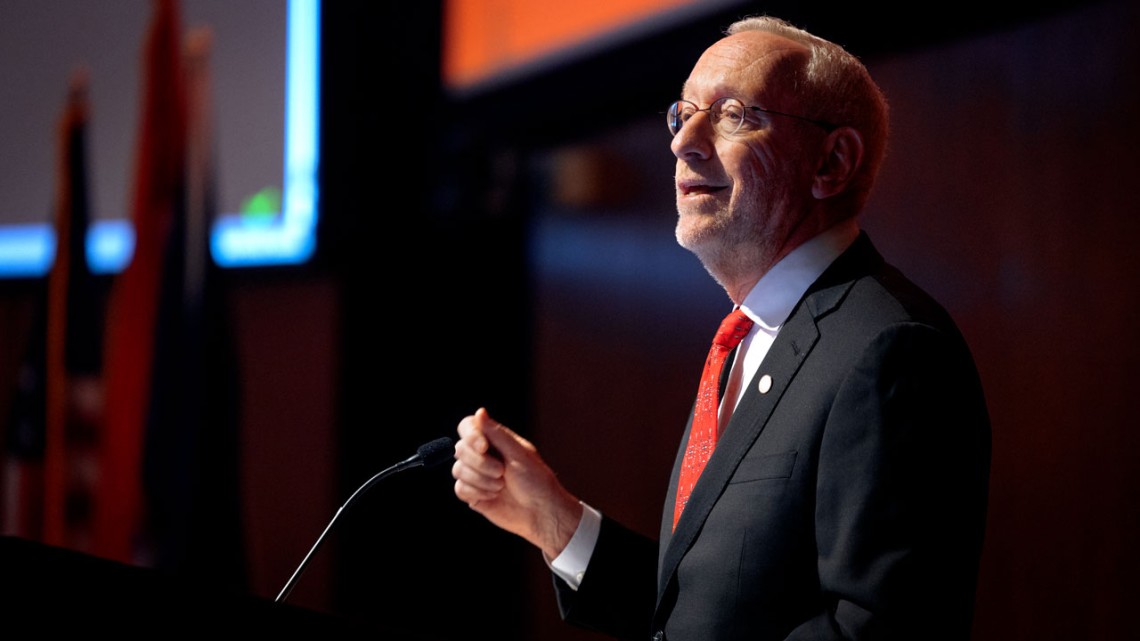Freedom + Responsibility
At Cornell, we are deeply committed to fostering an environment where freedom and responsibility are not just principles, but the foundation of our daily interactions and growth. The Freedom and Responsibility initiative is inspired by Carl Becker’s challenge to all of us to temper passions with reasoned discourse and civil engagement and to remember what we owe each other in this precious community. This initiative invites every member of our community — students, staff, faculty and alumni — to engage deeply with one another through reasoned discourse, civil engagement and mutual respect.
As we embrace the freedom to learn, explore and share ideas, we also acknowledge the responsibilities that come with being part of a diverse academic community that is united in its mission. This means not only advancing knowledge and innovation but also upholding respect and consideration for differing viewpoints.
Join us in this important dialogue as we continue to shape a community that honors both the liberties and the duties we share in our pursuit of greater understanding and impact.
Featured Programs/Events
The Center for Dialogue & Pluralism (CDP), formerly the Intergroup Dialogue Project (IDP), works to foster a campus culture of democratic engagement and intentional communication across and about differences. This year's offerings include enhanced workshops, specialized courses and targeted training designed to facilitate collective exploration of current issues and thoughtful dialogues rooted in curiosity and connection.
Learn MoreGuided by Kenneth Roberts, the Richard J. Schwartz Professor of Government, researchers across the Einaudi Center are monitoring evolving democratic norms and threats to democracy in the United States and around the world. This work is vital today, as our ability to address a range of global challenges—from pandemics and climate change to human rights—often hinges on the strength of representative institutions that provide voice and access to diverse societal interests and actors.
Learn MoreThe Einaudi Global Scholars program is a co-curricular space for studying and practicing how individuals and communities can engage about, with and across difference and disagreement to work toward collective understanding and action on challenging global issues. This year, as approximately half the world’s population head to the polls in local and national elections, the Global Scholars will contribute to the campus conversation on building democracy.
Learn MoreA series of events presenting various viewpoints on the election process, designed to engage students in dialog on the Presidential election and the current political environment. Includes a series of films with post-film discussions, an election watch party and a session on post-election reactions.
Learn MoreCosponsored by the Department of Government, the American Studies Program, and the Center on Global Democracy at the Brooks School of Public Policy, Cornell Cinema presents a series of iconic, American political dramas in honor of the upcoming presidential election. The series aims to provide space for thoughtful reflection about the challenges facing our democracy today and features films that address various aspects of the political process.
Learn MoreEngagement Opportunities
Resources
Center on Global Democracy
The Cornell Brooks School of Public Policy’s Center on Global Democracy tackles the fundamental questions facing democracies, serving as a hub for research and learning to strengthen democratic institutions.
Guide on strategies for cultivating democratic education and dialogue
A written guide, designed to help faculty and staff prepare to facilitate productive dialogue related to sociocultural and political issues.
Engaging Viewpoint Diversity in the Classroom
The Center for Teaching Innovation offers a framework and approaches to encouraging free and open inquiry, engaging wide-ranging and sometimes conflicting or contending ideas, and fostering inclusive learning environments where students feel challenged and supported.
Global Cornell, Global Democracy
Throughout this academic year, Global Cornell is hosting events and discussions dedicated to exploring global democracy, democratic institutions and how to safeguard them, representation and accountability, and the transnational impacts people around the world will experience as this year of elections unfolds.


